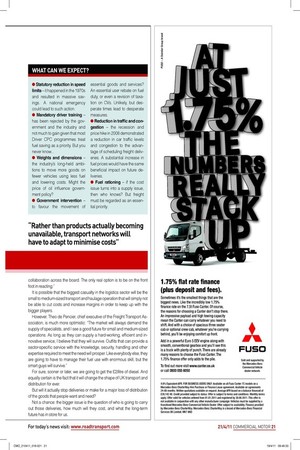WHAT CAN WE EXPECT?
Page 16

If you've noticed an error in this article please click here to report it so we can fix it.
● Statutory reduction in speed limits – it happened in the 1970s and resulted in massive savings. A national emergency could lead to such action.
● Mandatory driver training – has been rejected by the government and the industry and not much to gain given that most Driver CPC programmes treat fuel saving as a priority. But you never know...
● Weights and dimensions – the industry’s long-held ambitions to move more goods on fewer vehicles using less fuel and lowering costs. Might the price of oil influence government policy?
● Government intervention – to favour the movement of essential goods and services? An essential user rebate on fuel duty, or even a revision of taxation on CVs. Unlikely, but desperate times lead to desperate measures.
● Reduction in trafワc and congestion – the recession and price hike in 2008 demonstrated a reduction in car traffic levels and congestion to the advantage of scheduling freight deliveries. A substantial increase in fuel prices would have the same beneficial impact on future deliveries.
● Fuel rationing – if the cost issue turns into a supply issue, then who knows? But freight must be regarded as an essential priority.













































